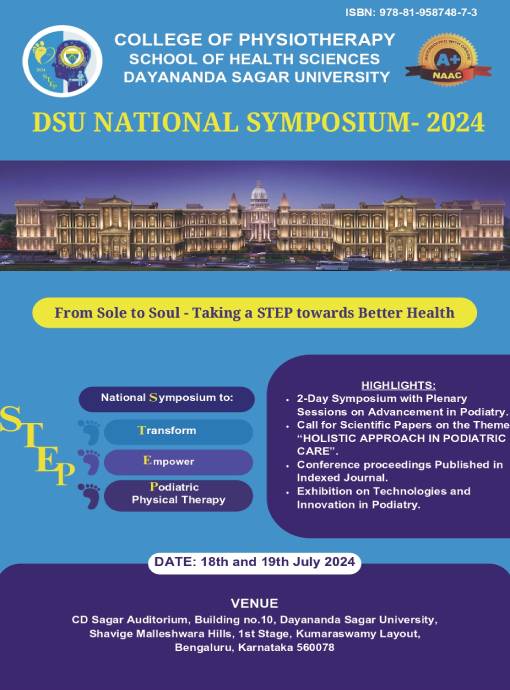Preliminary Findings on the Impact of Inspiratory Muscle Training on Blood Pressure, Lung Function, and Functional Capacity in Essential Hypertension: A Pilot Study
DOI:
https://doi.org/10.18311/DSUPHY/9788195874873/2024/009Keywords:
Essential Hypertension; Forced Vital Capacity (FVC); Forced Expiratory Volume in 1 second (FEV1); IMT - Inspiratory Muscle Training; 6 Minute Walk Test; Pulmonary Function TestsAbstract
Introduction: Uncontrolled blood pressure is one of the main risk factors for cardiovascular diseases and globally are the most common cause of death and disease. Among the array of non-pharmacologic treatments, a prolonged regimen of inspiratory muscle training has produced remarkable outcomes, such as enhanced blood pressure control and restored autonomic balance in individuals with hypertension, as well as improved baroreflex sensitivity.
Objective: To evaluate the feasibility and preliminary effects of inspiratory muscle training on blood pressure, pulmonary functions, and functional capacity in individuals with essential hypertension.
Methodology: Study Design: This is a single-arm pilot study with a pre-post intervention design.
Participants: A convenience sample of 30 adults (Age 40-60) diagnosed with essential hypertension divided into 2 groups, 15 in control and 15 in experimental group, Participants will be recruited from a local hypertension clinic.
Intervention: Participants will engage in a 6-week inspiratory muscle training program using the Threshold Inspiratory Muscle Training device (RESPIRONICS), followed by diaphragmatic breathing exercises while seated in a chair. The training will consist of supervised sessions conducted 6 times a week, with each session lasting 30 minutes. The control group will practice only slow-paced diaphragmatic breathing exercises at a rate of 15 to 20 breaths per minute. These sessions, held within the institution, will be customized to match each participant’s fitness level.
Results: Most interventions were conducted over a 6-week period, demonstrating improvements in systolic (6 mmHg) and diastolic (4 mmHg) blood pressure. Pre and post intervention assessments will be performed at the same time of day to reduce variability. Descriptive statistics will summarize participant demographics, while changes in blood pressure, pulmonary function, and functional capacity will be analyzed using paired t-tests. Conclusion: This pilot study explored the feasibility of incorporating Inspiratory Muscle Training (IMT) to reduce essential hypertension. Few studies have examined the effectiveness of IMT compared to conventional aerobic training, which has shown significant reductions in systolic and diastolic blood pressure through decreased sympathetic activity. Additionally, IMT has demonstrated notable improvements in FVC and FEV1 values, as well as significant enhancements in 6-minute walk test performance.
 Shwetha S. S.
Shwetha S. S.
